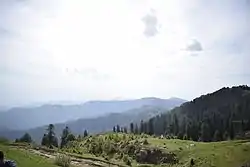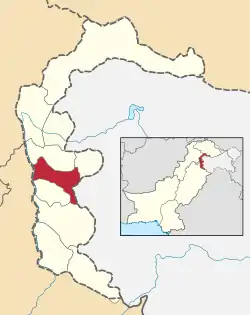Poonch District, Pakistan
The Poonch District (Urdu: ضلع پونچھ ) is one of the 10 districts of Pakistan's dependent territory of Azad Kashmir. The Poonch District is bounded on the north by the Bagh District, on the north-east by the Haveli District, on the south-east by the Poonch District of Indian-administered Jammu and Kashmir, on the south by the Sudhanoti District and the Kotli District, and on the west by the Rawalpindi District of Pakistan's Punjab Province. The Poonch District is part of the greater Kashmir dispute between India and Pakistan. The district headquarters is the city of Rawalakot.
Poonch District
ضلع پونچھ | |
|---|---|
 | |
 Map of Azad Kashmir with the Poonch District highlighted in red | |
| Sovereign state | |
| Dependent territory | |
| Division | Poonch Division |
| Area | |
| • Total | 855 km2 (330 sq mi) |
| Population (2017)[1] | |
| • Total | 500,571 |
| Number of tehsils | 4 |
History
From the end of seventeenth century up to 1837 CE, Poonch was ruled by the Muslim rajas of Loran in Haveli Tehsil. It then fell into the hands of Raja Faiztalab of the Punjab government. Poonch was included in the transfer of the hilly country to Maharaja Gulab Singh of Jammu and Kashmir in 1848. Before this transfer, Poonch was considered a district of Lahore. Maharaja Gulab Singh granted Chibal, Poonch, and other areas to Jawahar Singh and Moiti Singh. The raja of Poonch had to present to the Maharaja one horse with gold trappings. The raja of Poonch was not permitted to effect any administrative changes in the territory of Poonch without prior consultation with the Maharaja of Kashmir.
Separation of Poonch
.svg.png.webp)
(The Poonch Divion was created from the Azad Kashmiri-administered portion of the pre-1947 Poonch District.)
After independence in 1947, there was a rebellion in the western part of the Poonch District. The rebels led by Sardar Muhammad Ibrahim Khan, sought support from the Dominion of Pakistan, which provided arms and then launched an invasion of its own, using Pashtun tribals. In response, the Maharaja of Jammu and Kashmir joined India, and the conflict turned into an Indo-Pakistani war. When a ceasefire was effected, the Poonch District was divided into two separate districts. The former capital city of Poonch, came under Indian administration, and a new capital in the western district was eventually established at Rawalakot.
Of the four tehsils of the original Poonch District, viz., Bagh, Sudhnoti, Haveli, and Mendhar, the Azad Kashmiri Poonch Division included the first two and a portion of the third. Those three tehsils were eventually made separate districts, and a new Poonch District was created in the center of the Poonch Division by incorporating portions of the Bagh and Sudhnoti tehsils.
Administrative divisions
The district is administratively subdivided into four tehsils:[2]
Education
According to the Pakistan District Education Ranking 2017, a report released by Alif Ailaan, the Poonch District is ranked at number 8 nationally, with an education score of 73.52. Over the past five years, the Poonch District has shown the most improvement in the establishment of middle schools. The learning score for the Poonch District is 84.15.[3]The school infrastructure score for the Poonch District is 14.88, ranking the district at number 151, which places it in the bottom five districts relating to infrastructure in Pakistan and its two dependent territories. Schools in the Poonch District also have severe problems with regard to electricity, drinking water, and boundary walls, as reflected in their scores of 2.67, 12.1, and 6.23, respectively.[3] The state of some school buildings also presents a major safety risk for students.
Transport
The Poonch-Rawalakot bus, which crosses the LOC, has helped to re-establish ties across the border.
See also
References
- "Statistical Year Book 2019" (PDF). Statistics Azad Jammu and Kashmir. Retrieved 20 April 2020.
- "Tehsils of Poonch District on AJK map". ajk.gov.pk. AJK Official Portal. Retrieved 17 November 2019.
- "Pakistan District Education Rankings 2017" (PDF). elections.alifailaan.pk. Alif Ailaan. Retrieved 17 November 2019.
Bibliography
- Snedden, Christopher (2013) [first published as The Untold Story of the People of Azad Kashmir, 2012], Kashmir: The Unwritten History, HarperCollins India, ISBN 9350298988
- Snedden, Christopher (2015), Understanding Kashmir and Kashmiris, Oxford University Press, ISBN 978-1-84904-342-7
External links
| Wikimedia Commons has media related to Poonch District, Pakistan. |
- Official website of the Government of Azad Kashmir
 Azad Jammu and Kashmir travel guide from Wikivoyage
Azad Jammu and Kashmir travel guide from Wikivoyage
